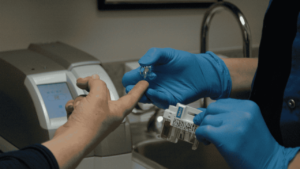How to relieve nerve pressure naturally at home? Easy and effective ways!
Nerve pain can be serious ,Have you ever suddenly felt a sharp stabbing pain, numbness or tingling in the hand, foot or any part of the body? Feels like an “electric shock”? These can be symptoms of Nerve Pressure or Pinched Nerve. This is a common problem that occurs when surrounding tissues (such as bones, cartilage, muscles or tendons) put excessive pressure on a nerve.
Why does pressure occur ?
Wrong posture: Sitting, standing or sleeping in the wrong way for a long time.
Injury or trauma: During sports or due to an accident.
Repetitive tasks: Doing the same type of movement repeatedly (such as typing on a computer).
Arthritis or bone spurs: Growths in bones or joint problems.
Herniated disc / slip disc: Dislocation of a disc in the spine from its place.
Obesity: Excess weight can put pressure on nerves
Pregnancy: Changes in the body can also cause pressure on nerves.
Natural and easy ways to relieve pressure at home.
If your nerve pressure is not serious, you can get relief with these home remedies. If the pain persists, worsens, or weakness or numbness increases, contact a doctor immediately.
1. Adequate rest and positional changes
Rest the affected area: Rest the part where the pressure is felt for a while. Avoid activities that increase pain. For example, if there is neck pain, avoid lifting heavy things for a while.
Change sleeping position: Sleeping incorrectly can put pressure on the nerve.
Sleep on the back and place a pillow under the knees.
Sleep on the side and place a pillow between the knees so that the spine remains straight.
Avoid sleeping on the stomach, as it puts pressure on the neck and spine.
Improve your sitting posture: Sit up straight on a chair, support your waist, and keep your feet flat on the floor. Get up and walk around every 30-45 minutes.
2. Hot and Cold Therapy
This is an effective way to reduce pain and swelling:
Ice Pack: In the first 24-48 hours, apply ice to the affected area (do not apply directly on the skin, wrap it in a cloth) for 15-20 minutes, 2-3 times a day. This will help reduce swelling and pain.
Heat Pack: After the swelling subsides, apply a hot water bag or hot towel. Heat relaxes muscles and increases blood circulation, which relieves pain. You can also alternate between hot and cold compresses.
3. Gentle Exercises and Stretching.
Start Slow: After the pain subsides, gradually start gentle exercises and stretching. Stop immediately if you feel pain.
Yoga and Pilates: Gentle yoga and Pilates exercises strengthen the body’s core (abdominal and back) muscles, increase flexibility and improve posture, which can reduce pressure on nerves.
Nerve Gliding: These are special exercises that help the nerves to gently glide in the tissues around them, thereby reducing pressure. These exercises vary according to your affected area (such as for neck, arms or legs). It would be better if you learn them from a physiotherapist.
Low-impact exercises: Exercises like walking, swimming, or cycling (at light resistance) improve blood circulation and strengthen muscles without putting too much pressure on the vein.
4. Correct Posture and Ergonomics.
Sitting posture: If you work at a desk, adjust your chair so that your feet are flat on the floor, knees are slightly below hips, and your back is supported.
Screen height: The computer monitor should be at eye level so you don’t have to bend your neck.
Lifting method: When lifting anything heavy, keep your back straight and bend your knees. Keep the object close to your body and use leg strength rather than your back.
5. Lifestyle Changes.
Maintain a healthy weight: Excess weight, especially around the belly, can put extra pressure on the spine and nerves. Keep weight under control with a balanced diet and regular exercise.
Stress management: Stress can cause muscles to tighten, which can increase pain and nerve pressure. Try yoga, meditation, deep breathing exercises, or a calming activity of your choice (like reading books or listening to music) to keep your weight under control.
Water intake: Drink enough water. Proper hydration is important for the health of body tissues and nerves.
Quit smoking: Smoking impairs blood circulation, which can damage nerves and increase pain.
When to see a doctor?
The pain is very severe.
The pain is persistent (more than a few days).
The pain is spreading to other parts of the body (such as numbness or weakness in the leg).
Increasing muscle weakness or numbness.
Having problems with bladder or bowel control.
These could be signs of serious problems that require immediate medical attention.
Frequently Asked Questions (FAQs) .
Q1: What are a pinched nerves?
A1: Nerve pressure or pinched nerve occurs when surrounding tissue such as bone, cartilage, muscle or tendon puts excessive pressure on a nerve. This pressure can cause pain, numbness, tingling or weakness, often radiating to the part of the body where the nerve passes.
Q2: What are the common symptoms of pressure?
A2: Common symptoms of pressure include sharp, stabbing or burning pain in the affected area, numbness, tingling (feeling like pins and needles), muscle weakness, and sometimes pain that gets worse at night. These symptoms may be felt in the arms, legs, neck or lower back.
Q3: What to do to get instant relief from pressure at home?
A3: For quick relief at home, rest the affected area, avoid activities that cause pain. Use cold compresses (ice) for the first 24-48 hours to reduce swelling. After that, warm compresses can help relax the muscles. Try to reduce the pressure on the nerve by changing your sleeping or sitting position.
Q4: Can exercise and stretching reduce pressure on it ?
A4: Yes, light exercises and stretching can be helpful, but should be stopped immediately if pain occurs. Light yoga, Pilates, or nerve gliding exercises prescribed by a physiotherapist can provide mobility to the nerves and reduce pressure. However, in severe pain it is important to rest first and consult a doctor before starting any exercises.
Q5: When should I see a doctor?
A5: If the compression pain is severe, persistent (more than a few days), does not respond to home treatment, or symptoms such as numbness in the leg/arm, weakness, or balance problems worsen, you should see a doctor (such as an orthopedist or neurologist) immediately. These may be signs of serious neurological damage.
Q6: Can obesity cause nerve compression?
A6: Yes, obesity can be a significant cause of nerve compression. Excess body weight puts unnecessary pressure on the spine and joints, which can lead to nerve compression, especially in the back and legs. Maintaining a healthy weight helps prevent and reduce nerve compression.













Post Comment